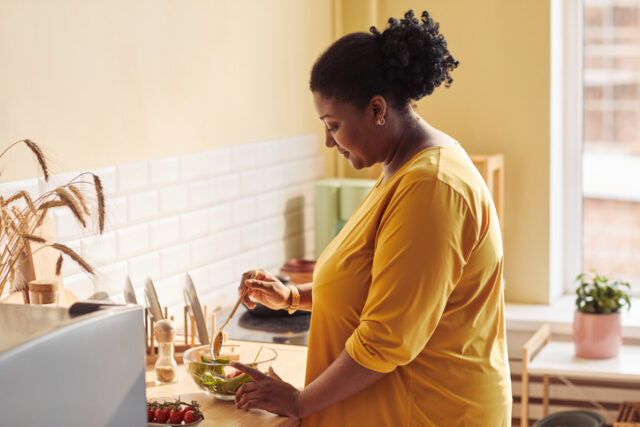Living well on less isn’t about restriction—it’s about intention.

It means building habits that support your peace, your goals, and your daily life without constantly chasing more. When you have routines that ground you, life starts to feel less about what you lack and more about what you’ve chosen. These routines might seem simple, but they make a real difference when your focus is on living well, not just spending big.
1. Sticking to a weekly money check-in, even when things feel tight

Instead of avoiding your bank account or hoping everything balances itself out, you carve out time each week to review your spending. You don’t need to obsess over every detail, but you keep a pulse on what’s coming in, what’s going out, and what’s changing. This small act builds long-term clarity. It keeps you grounded and proactive, and it prevents those stressful moments where you suddenly feel out of control without knowing why.
2. Making meals at home more often than you dine out

Cooking for yourself doesn’t have to mean elaborate recipes or full grocery hauls. When you make it a habit, even a low-effort one, you keep your budget steady and your nutrition balanced. Eventually, this habit pays off. You develop go-to meals, waste less food, and stop spending extra just for convenience. On the nights you do go out, it feels like a treat instead of a fallback.
3. Building your day around needs, not wants

You get honest about what needs to happen and what’s just noise. Whether it’s errands, routines, or time to reset, you create a structure that puts purpose before impulse. Living on less means learning to meet your needs with clarity instead of constantly chasing dopamine. That change in rhythm changes how your days feel, and how your money flows through them.
4. Choosing reusable, refillable, or second-hand whenever possible

You don’t buy new just for the sake of it. You look for alternatives—borrow, trade, thrift, or refill—because you know the initial savings stack up. You also know that over time, this approach creates less waste and more freedom. It’s not about going without. It’s about reframing what “value” actually means to you, and leaning into routines that serve you long-term, not just in the moment.
5. Having a set routine for tackling bills and non-negotiables

Instead of putting off the paperwork or dodging due dates, you have a rhythm. Maybe it’s paying things on the same day each month, or automating what you can. Either way, you keep your baseline handled. That small layer of structure keeps late fees away and financial anxiety lower. And it frees up energy for more creative or meaningful decisions later on.
6. Creating designated “no-spend” days or weeks

You build space into your calendar where you don’t shop—not even for small things. It helps you get more intentional with what you already have and stops you from making stress-fuelled or boredom-based purchases. As time goes on, these mini breaks reset your habits. They remind you that waiting isn’t a punishment—it’s just part of building a healthier, more aligned relationship with money.
7. Rotating what you already own instead of constantly replacing

Whether it’s clothes, home items, or beauty products, you get used to working with what’s in front of you. You put things back into rotation, restyle what you’ve forgotten, and let old favourites shine again. It’s not about scarcity—it’s about sustainability. You stop thinking in terms of “new” and start thinking in terms of “enough.” That change saves more than just money.
8. Building a habit of checking your pantry before buying anything

Instead of wandering the grocery store without a plan, you start with what you already have. You build meals around what’s in the fridge and use leftovers intentionally instead of treating them like a chore. That mindset reduces waste, curbs impulse buys, and stretches your grocery budget further. It’s a rhythm that adds up fast, especially when done consistently.
9. Keeping a simple system for saving, even small amounts

Even if it’s just rounding up your change or setting aside £10 a week, you create a system that happens without too much thought. It’s automatic, steady, and aligned with your actual lifestyle. What matters isn’t the size of the savings—it’s the consistency. That little habit builds a cushion, gives you options, and proves that progress doesn’t need to be flashy to be effective.
10. Regularly clearing clutter instead of constantly organising it
 Source: Unsplash
Source: Unsplash You don’t spend your time trying to fit more into less space. You develop the routine of letting things go before they become overwhelming. You stop asking how to store more, and start asking what’s still serving you. This keeps your environment calm and your spending more intentional. It helps you break the cycle of buying to fix clutter that only exists because you kept too much in the first place.
11. Making room for joy that doesn’t come with a price tag

You don’t put your happiness on hold until you can afford something new. Instead, you build joy into your daily routine through nature, connection, creativity, or rest. These are the moments that fill you up without draining your wallet. The more you normalise non-monetised joy, the less pressure you feel to constantly chase it through spending. And that makes your day-to-day feel lighter, even on a tighter budget.
12. Repeating what works—without the pressure to reinvent

You don’t waste energy constantly optimising or changing things just to keep up. When something works—be it a schedule, a recipe, or a budget—you keep it in rotation. You let your routines be stable, not performative. Living well on less doesn’t mean living with less joy or order. It just means being smart about what holds you up, and letting those habits stay, even when they’re quiet and unglamorous.




